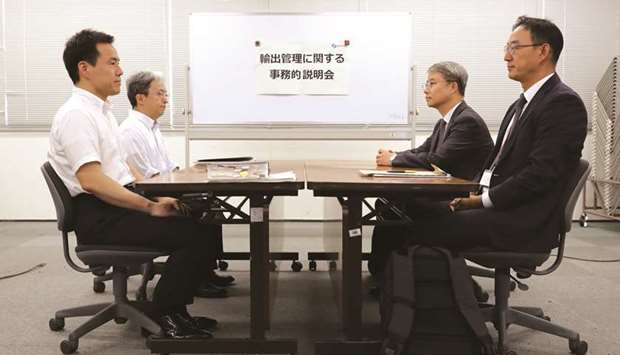Japanese and South Korean officials held hours of talks yesterday to discuss a worsening diplomatic row that has prompted Washington to offer to mediate between the US
allies.
The meeting between representatives from Japan’s trade ministry and South Korea’s foreign ministry ran hours longer than expected but there was no sign of a detente in the
simmering dispute.
Japan last week ramped up long-running tensions over the use of forced labour during World War Two by announcing restrictions on exports used by South Korean chip and smartphone companies.
The move sparked anger in Seoul, but also raised international concern about the effect on the global tech supply chain and the possibility of price hikes for consumers.
Tokyo says the constraints, which apply to three chemicals as well as technology transfers, were made necessary by a “loss of trust” in relations with Seoul, but also accuses South Korea of improperly handling exports of sensitive materials from Japan.
And Japanese officials said they defended their decision in yesterday’s talks.
“We confirmed Japan’s safety management system on exports,” a spokesperson from the Ministry of Economy, Trade and Industry told reporters, speaking on condition of anonymity.
“We answered all their questions in a careful manner and explained that this is based on international rules. It is not a World Trade Organisation violation, and it is not a countermeasure.”
But earlier in Seoul, President Moon Jae-in’s office said South Korea had done nothing wrong and called for a third-party investigation into Japan’s claims.
The brief glimpse given to media of the meeting suggested an environment that was anything but warm - the two Japanese officials remained stony-faced and sitting at a table when their South Korean counterparts arrived, offering no apparent greetings or handshakes before reporters were ushered out.
The new restrictions, which significantly slow exports, took effect from July 4.
Japanese officials are weighing additional measures including removing South Korea from a “white list” of countries that face minimal constraints on technology transfers with
national security implications.
Seoul has threatened to take the issue to the World Trade Organisation and also urged Washington to intervene.
US officials said they would “do everything we can” to ease tensions, without offering a specific opinion on Japan’s measures.
Relations between the American allies have long been strained over issues related to Tokyo’s brutal 1910-45 colonial rule over the Korean peninsula.
But ties have been further hurt by a series of rulings from South Korean courts ordering Japanese firms that used wartime forced labour to
compensate victims.
Experts said there was little hope of either side backing down quickly, with both Moon and Japan’s Prime Minister Shinzo Abe unlikely to offer concessions.
“As the dispute deepens, it is increasingly difficult for either Moon or Abe to yield,” wrote Tobias Harris, an analyst at the Teneo consultancy group, in
a note.
Any compromise by Moon “would likely be seen as capitulation to Japanese economic coercion and could trigger a
backlash,” Harris wrote.
“Meanwhile, the South Korean reaction has likely convinced Abe that he has hit a pressure point... and could encourage his administration to intensify the pressure to goad Moon into
surrendering.”
Japanese officials appeared to rule out further talks.
“We think we fully answered all the questions,” the spokesperson from Japan’s Ministry of Economy, Trade and Industry said.
“We will accept emails if they have technical questions.”

Working level officials from Japan, left, and South Korea hold a meeting about Japan’s recent restrictions on exports of high-tech material to South Korea in Tokyo yesterday.
